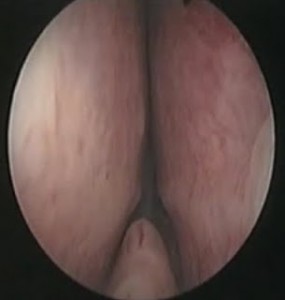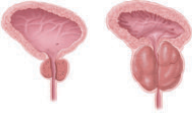
Benign prostatic hyperplasia
What is benign prostatic hyperplasia (BPH)?
BPH is the benign (non-cancerous) increase in the size of the bladder. The prostate grows during adolescence and early adulthood until it acquires its normal size. Generally the prostate grows until it reaches the size of a walnut. However it can start to grown again when a man reaches maturity. The reasons for this growth are not clearly understood. By the time a man is 80, more than 80% of men suffer from BPH. This condition produces symptoms in many older men.
Normal prostate Benign prostatic hyperplasia
What are the symptoms of and enlarged prostate?

An enlarged prostate puts pressure on the urethra. This pressure can obstruct the flow of urine through the urethra. The obstruction of the flow of urine can cause problems which include:
Symptoms
- Frequent urination, especially at night (nicturia).
- Low flow.
- Urgent and sudden need to urinate.
- Difficulty in starting and stopping urination.
- Inability to empty the bladder completely.
- Sensation of pressure or tension when urinating.
- Pain or stinging during urination.



